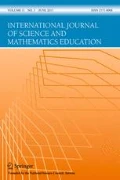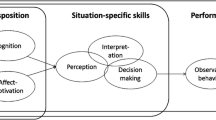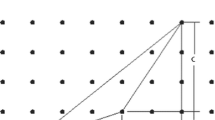Abstract
This study addresses the relation of pre-school teachers’ mathematics content knowledge and their performance—how they perceive mathematical learning situations and whether they are able to plan adequate actions that foster children’s learning—in the informal settings of pre-schools. It thus addresses a serious gap in teacher research that has so far mostly been focussed on the formal settings of primary and secondary schools. The paper presents the instruments used to assess the knowledge (a paper–pencil test) and the performance (a video-based assessment), as well as the results of a study involving 354 prospective pre-school teachers. The results indicate that mathematical content knowledge is a significant predictor of the pre-school teachers’ ability to perceive learning situations and to plan educational actions to foster learning. Such evidence not only supports the validity of the knowledge test, but it is also relevant for policy makers because it leads to conclusions about the important opportunities to learn that need to be provided during pre-school teacher training.





Similar content being viewed by others
References
Anders, Y. (2012). Modelle professioneller Kompetenzen für frühpädagogische Fachkräfte. Aktueller Stand und ihr Bezug zur Professionalisierung. Expertise zum Gutachte,, Professionalisierung in der Frühpädagogik“ [Models of professional competence for pre-school teachers. Current status and its relationship to professionalization. Expertise to the report of professionalization of early education], Aktionsrat Bildung.
Aubrey, C. (1994). An investigation of children’s knowledge of mathematics at school entry and the knowledge their teachers hold about teaching and learning mathematics, about young learners and mathematical subject knowledge. British Educational Research Journal, 20(1), 105–120.
Baer, M., Dörr, G., Fraefel, U., Kocher, M., Küster, O., Larcher, S., Müller, P., Sempert, W. & Wyss, C. (2007). Werden angehende Lehrpersonen durch das Studium kompetenter?—Kompetenzaufbau und Standarderreichung in der berufswissenschaftlichen Ausbildung an drei Pädagogischen Hochschulen in der Schweiz und in Deutschland [Become prospective teacher competent during academic studies? – Increasing competence and achieving standards in the vocational studies at three pedagogical universities in Switzerland and Germany]. Unterrichtswissenschaft, 35(1), 15–47.
Ball, D. & Bass, H. (2000). Interweaving content and pedagogy in teaching and learning to teach: Knowing and using mathematics. In J. Boaler (Ed.), Multiple perspectives on the teaching and learning of mathematics (pp. 83–104). Westport, CT: Ablex.
Ball, D. & Bass, H. (2009). With an eye on the mathematical horizon: Knowing mathematics for teaching to learners’ mathematical futures. In M. Neubrand (Ed.), Beiträge zum Mathematikunterricht 2009 (pp. 11–22). Münster: WTM.
Bandalos, D. L. & Finney, S. J. (2001). Item parceling issues in structural equation modeling. In G. A. Marcoulides & R. E. Schumacker (Eds.), Advanced structural equation modeling: New developments and techniques (pp. 269–296). Mahwah, NJ: Erlbaum.
Baumert, J., Kunter,M., Blum,W., Brunner,M., Voss, T., Jordan, A., Klusmann, U., Krauss, S., Neubrand, M. & Tsai, Y. M. (2010). Teachers‘ mathematical knowledge, cognitive activation in the classroom, and student progress. American Educational Research Journal, 7(1), 133–180.
Benz, C. (2012). Attitudes of kindergarten educators about math. Journal für Mathematikdidaktik, 33(2), 203–232.
Blomberg, G., Stürmer, K. & Seidel, T. (2011). How pre-service teachers observe teaching on video: Effects of viewers‘ teaching subjects and the subject of the video. Teaching and Teacher Education, 27, 1131–1140.
Blömeke, S., Felbrich, A., Müller, C., Kaiser, G. & Lehmann, R. (2008). Effectiveness of teacher education. State of research, measurement issues and consequences for future studies. ZDM – The International Journal on Mathematics Education, 40(5), 719–734.
Blömeke, S., Kaiser, G., Döhrmann, M., Suhl, U. & Lehmann, R. (2010). Mathematisches und mathematikdidaktisches Wissen angehender Primarstufenlehrkräfte im internationalen Vergleich [Mathematical content and mathematics pedagogical content knowledge of prospective primary school teachers in international comparison]. In S. Blömeke, G. Kaiser & R. Lehmann (Eds.), TEDS-M 2008 – Professionelle Kompetenz und Lerngelegenheiten angehender Primarstufenlehrkräfte im internationalen Vergleich (pp. 195–252). Münster: Waxmann.
Blömeke, S., Baack, W., Dunekacke, S., Grassmann, M., Jenßen, L., Wedekind, H., Tengler, M. & Koinzer, T. (2014a). Effects of opportunities to learn on the mathematics pedagogical content knowledge of kindergarten teachers. Presentation on the AERA 2014 Annual Meeting in Philadelphia.
Blömeke, S., König, J., Busse, A., Suhl, U., Benthien, J., Döhrmann, M. & Kaiser, G. (2014b). Von der Lehrerausbildung in den Beruf: Fachbezogenes Wissen als Voraussetzung für die Wahrnehmung, Analyse und Reaktion im Unterricht [From teacher training in the profession: Subject-related knowledge as a precondition for perception, analysis and response in the instruction]. Zeitschrift für Erziehungswissenschaft, 3, 509–542.
BMFSFJ (Bundesministerium für Familien, Senioren, Frauen und Jugend) (2010). Männliche Fachkräfte in Kindertagesstätten—eine Studie zur Situation von Männern in Kindertagestätten und in der Ausbildung zum Erzieher [Male professionals in kindergartens – A study on the situation of men in kindergartens and in the training of pre-school teachers]. Berlin: Sinus Sociovision.
Common Core State Standards Initiative (2014). Common core state standards for mathematics. Retrieved from: http://www.corestandards.org/wp-content/uploads/Math_Standards.pdf. Accessed 19 March 2014)
Copley, J. V. (2004). The early childhood collaborative: A professional development model to communicate and implement the standards. In D. H. Clements & J. Sarama (Eds.), Engaging young children in mathematics. Standards for early childhood mathematics education (pp. 401–414). Mahwah, NJ: Lawrence Erlbaum Associates.
Cronbach, L. J. & Meehl, P. E. (1955). Construct validity in psychological tests. Psychological Bulletin, 52, 281–302.
Dahle, G. (2007). Naturwissenschaften und Mathematik im Kindergarten – Wohin führt der Weg [Science and mathematics in kindergarten – Where does the road go]? Retrieved from: http://www.kindergartenpaedagogik.de/1625.html. Accessed 23 September 2014
Darling-Hammond, L. (2006). Assessing teacher education. The usefulness of multiple measures for assessing program outcomes. Journal of Teacher Education, 57(2), 120–138.
Duncan, G. J., Dowsett, C. J., Claessens, A.,Magnuson, K., Huston, A. C., Klebanov, P., Pagani, L., Feinstein, L., Engel,M., Brooks-Gunn, J., Sexton, H., Duckworth, K. & Japel, C. (2006). School readiness and later achievement. Developmental Psychology, 43(6), 1428–1462.
Dunekacke, S., Buhl, M., Jenßen, L., Baack, W., Grassmann, M. & Blömeke, S. (2014). Mathematisches Fachwissen von angehenden Erzieher/-innen und Grundschullehrer/-innen im Vergleich [Mathematical content and mathematics pedagogical content knowledge of prospective pre-school and primary school teachers in comparison]. Presentation on the Symposium – Perspektiven mathematischer Bildung im Übergang vom Kindergarten zur Grundschule, Freiburg.
Fan, X., Thompson, B. & Wang, L. (1999). Effects of sample size, estimation methods, and model specification on structural equation modeling fit indexes. Structural Equation Modeling: A Multidisciplinary Journal, 6(1), 56–83.
Fröhlich-Gildhoff, K., Nentwig-Gesemann, I. & Pietsch, S. (2011). Kompetenzorientierung in der Qualifizierung frühpädagogischer Fachkräfte. Eine Expertise der Weiterbildungsinitiative Frühpädagogische Fachkräfte (WiFF) [Competence orientation in the qualification of pre-school teachers. An expertise of the training initative pre-school teachers]. München: Deutsches Jugendinsitut e.V.
Ginsburg, H. P. & Ertle, B. (2008). Knowing the mathematics in early childhood mathematics. In O. N. Saracho & B. Spodek (Eds.), Contemporary perspectives on mathematics in early childhood education (pp. 45–66). Charlotte, NC: Information AGE.
Grüßing, M. & Peter-Koop, A. (Eds.). (2010). Die Entwicklung mathematischen Denkens in Kindergarten und Grundschule: Beobachten–Fördern–Dokumentieren [The development of mathematical thinking in kindergarten and primary school: Observe – foster – document]. Offenburg: Mildenberger.
Hiebert, J., Morris, A. K., Berk, D. & Jansen, A. (2006). Preparing teachers to learn from teaching. Journal of Teacher Education, 58(1), 47–61.
Hu, L. & Bentler, P. M. (1999). Cutoff criteria for fit indexes in covariance structure analysis: Conventional criteria versus new alternatives. Structural Equation Modeling: A Multidisciplinary Journal, 6(1), 1–55.
Jenßen, L., Dunekacke, S., Baack, W., Tengler, M., Wedekind, H., Grassmann, M. & Blömeke, S. (2013). Validating an assessment of pre-school teachers’ mathematical knowledge. Presentation on the 37th Conference of the Group for the Psychology of Mathematics Education, Kiel.
Kane, M. T. (1992). The assessment of professional competence. Evaluation & the Health Professions, 15(2), 163–182.
Kane, M. T. (2013). Validating the interpretations and uses of test scores. Journal of Educational Measurement, 50(1), 1–73.
Kaufmann, S. (2011). Handbuch für die frühe mathematische Bildung [Handbook of early math education]. Braunschweig: Schroedel.
Klibanoff, R. S., Levine, S. C., Huttenlocher, J., Vasilyeva, M. & Hedges, L. V. (2006). Preschool children’s mathematical knowledge: The effect of teacher “math talk”. Developmental Psychology, 42(1), 56–69.
KMK (Kultusministerkonferenz). (2004). Bildungsstandards im Fach Mathematik für den Primarbereich: Beschluss vom 15.10.2004 [Educational standards in mathematics for primary education. Resolution from Oktober, 10 th 2004]. München: Wolters Kluwer.
König, J., Blömeke, S., Klein, P., Suhl, U., Busse, A. & Kaiser, G. (2014). Is teachers’ general pedagogical knowledge a premise for noticing and interpreting classroom situations? A video-based assessment approach. Teaching and Teacher Education, 38, 76–88.
Krajewski, K. & Schneider, W. (2009). Early development of quantity to number-word linkage as a precursor of mathematical school achievement and mathematical difficulties: Findings from a four-year longitudinal study. Learning and Instruction, 19, 513–526.
Little, T. D., Cunningham, W. A., Shahar, G. & Widaman, K. F. (2002). To parcel or not to parcel: Exploring the question, weighing the merits. Structural Equation Modeling, 9, 151–173.
MacKinnon, D. P. (2008). Introduction to statistical mediation analysis. Mahwah, NJ: Erlbaum.
Mason, J. (1998). Enabling teachers to be real teachers: Necessary levels of awareness and structure of attention. Journal of Mathematics Teacher Education, 1, 243–267.
Mason, J. (2011). Noticing: Roots and branches. In M.G. Sherin, V.R. Jacobs & R.A. Philipp (Eds.), Mathematics teacher noticing: Seeing through teachers’ eyes (pp. 35–50). New York: Routledge.
Metzinger, A. (2006). Geschichte der Erzieherinnenausbildung als Frauenberuf [History of pre-school teacher training as a woman professionalization]. In L. Fried & S. Roux (Eds.), Pädagogik der frühen Kindheit. Handbuch und Nachschlagewerk (pp. 348–358). Weinheim: Beltz.
Muthén, L. K. & Muthén, B. O. (2007). Mplus user’s guide (5th ed.). Los Angeles: Muthén & Muthén.
National Advisory Panel (2008). The Final Report of the National Mathematics Advisory Panel. U.S. Department of Education: Washington, DC
Perrez, M., Huber, G. L. & Geißler, K. A. (2001). Psychologie der pädagogischen Interaktion [Psychology of educational interaction]. In A. Krapp & B. Weidenmann (Eds.), Pädagogische Psychologie. Ein Lehrbuch (pp. 358–413). Weinheim: Beltz.
Reynolds, A. (1995). One year of preschool intervention or two: Does it matter? Early Childhood Research Quarterly, 10, 1–31.
Santagata, R. & Guarino, J. (2011). Using video to teach future teachers to learn from teaching. ZDM Mathematics Education, 43, 133–145.
Santagata, R. & Yeh, C. (2013). Learning to teach mathematics and to analyze teaching effectiveness: Evidence from a video- and practice-based approach. Journal of Mathematics Teacher Education, 17(6), 491–514.
Schuler, S. (2013). Mathematische Bildung im Kindergarten in formal offenen Situationen—eine Untersuchung am Beispiel von Spielen zum Erwerb des Zahlbegriffs [Mathematics education in kindergarten in formal open situations – A study on the example of games for the acquisition of number concept]. Münster: Waxmann.
Seo, K.-H. & Ginsburg, H. P. (2004). What is developmentally appropriate in early childhood mathematics education? Lessons from new research. In D. H. Clements, J. Sarama & A.-M. DiBiase (Eds.), Engaging young children in mathematics: Standards for early childhood mathematics education (pp. 91–104). New York: Routledge.
Shulman, L. (1986). Those who understand: Knowledge growth in teaching. Educational Researcher, 15(2), 4–14.
Star, J. R. & Strickland, S. K. (2008). Learning to observe: Using video to improve preservice mathematics teachers‘ ability to notice. Journal for Mathematics Teacher Education, 11, 107–125.
Thonhauser, J. (2007). Lehrer/-innen handeln situationsspezifisch [Teacher interact situation-specific]. In A. Gastager, T. Hascher & H. Schwetz (Eds.), Pädagogisches Handeln: Balance zwischen Theorie und Praxis. Beiträge zur Wirksamkeitsforschung in pädagogisch-psychologischem Kontext. Erziehungswissenschaft, Band 24 (pp. 47–60). Landau: VEP.
van Es, E. A. & Scherin, M. G. (2006). Mathematics teachers’ “learning to notice” in the context of a video club. Teaching and Teacher Education, 24, 244–276.
van Oers, B. (2009). Emergent mathematical thinking in the context of play. Educational Studies in Mathematics, 74(1), 23–37.
Warfield, J. (2001). Teaching kindergarten children to solve word problems. Early Childhood Education Journal, 28, 161–167.
Weinert, F. E. (2001). Concept of competence: A conceptual classification. In D. S. Rychen & L. Hersh Salganik (Eds.), Defining and selecting key competencies. Göttingen: Hogrefe.
Weinert, F. E., Schrader, F.-W. & Helmke, A. (1990). Unterrichtssexpertise: Ein Konzept zur Verringerung der Kluft zwischen zwei theoretischen Paradigmen [Instruction-expertise: An approach to reduce the gap between two theoretical paradigms]. In L.-M. Alisch, J. Baumert & K. Beck (Eds.), Professionswissen und Professionalisierung: Sonderband in Zusammenarbeit mit der Zeitschrift Empirische Pädagogik (= Braunschweiger Studien zur Erziehungs- und Sozialarbeit, 28) (pp. 173–206). Braunschweig: Copy-Center Colmesee.
Widulle, W. (2009). Handlungsorientiert Lernen im Studium. Arbeitsbuch für soziale und pädagogische Berufe [Practice-orientated learning in academic studies. Workbook for social and educational professionals]. Heidelberg, Germany: Springer.
Wild, K.-P. & Krapp, A. (2001). Pädagogisch-psychologische Diagnostik [Educational and psychological diagnostic]. In A. Krapp & B. Weidenmann (Eds.), Pädagogische Psychologie. Ein Lehrbuch (pp. 513–563). Weinheim: Beltz.
Author information
Authors and Affiliations
Corresponding author
Rights and permissions
About this article
Cite this article
Dunekacke, S., Jenßen, L. & Blömeke, S. Effects of Mathematics Content Knowledge on Pre-school Teachers’ Performance: a Video-Based Assessment of Perception and Planning Abilities in Informal Learning Situations. Int J of Sci and Math Educ 13, 267–286 (2015). https://doi.org/10.1007/s10763-014-9596-z
Received:
Accepted:
Published:
Issue Date:
DOI: https://doi.org/10.1007/s10763-014-9596-z




